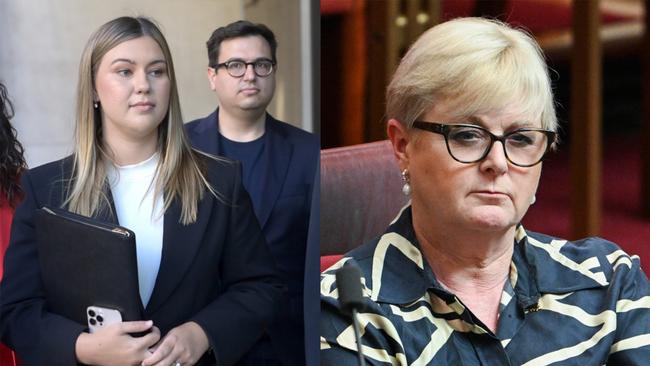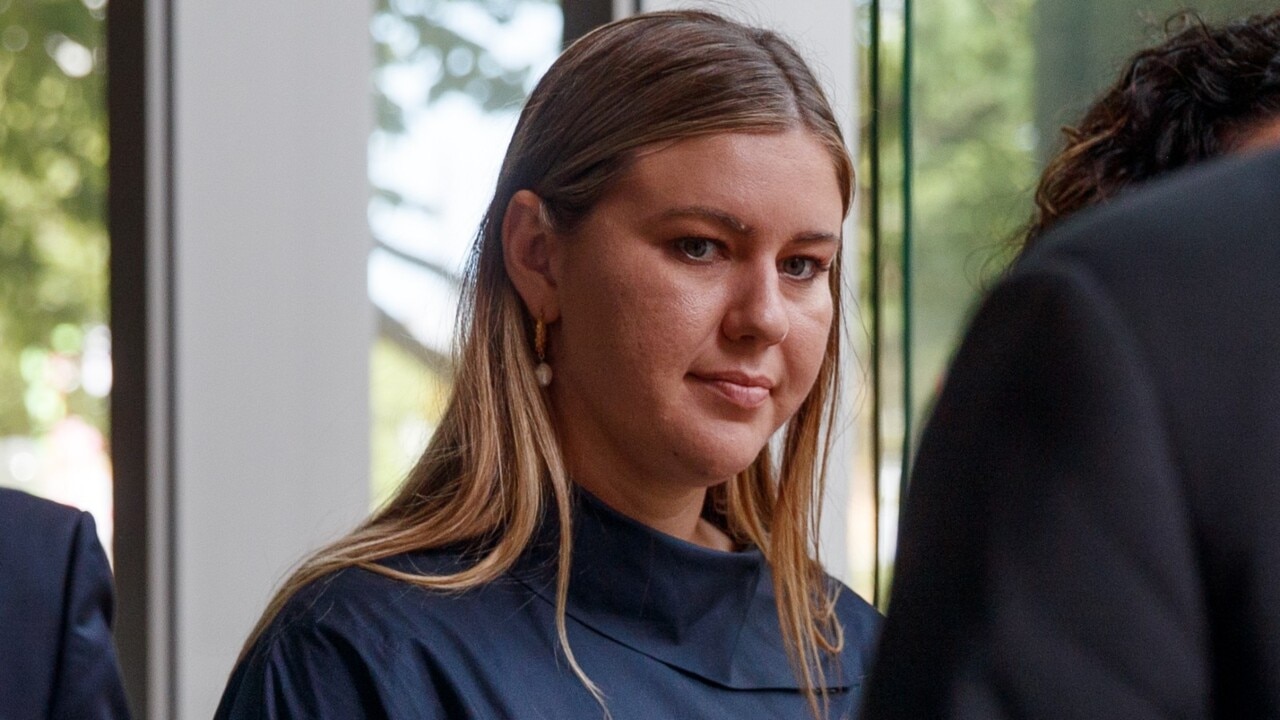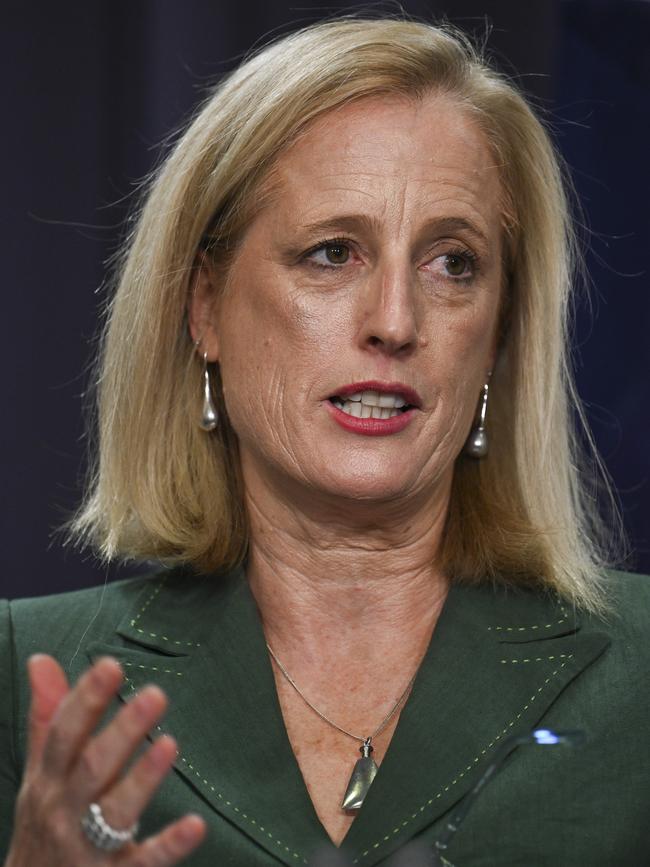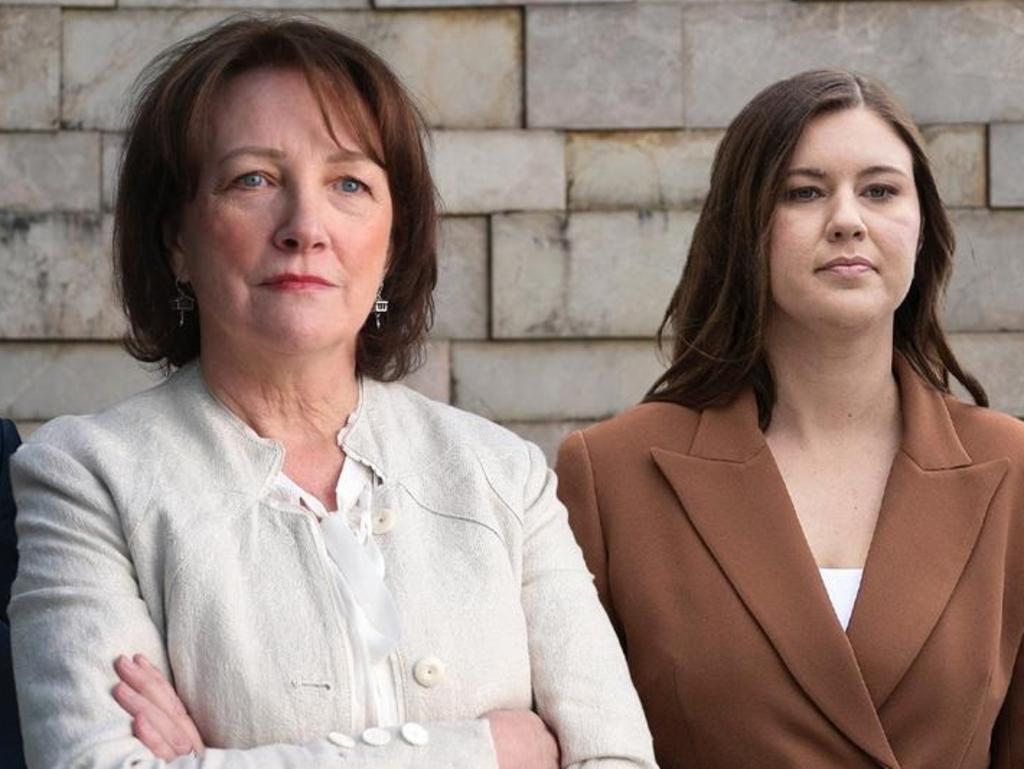
For many, showing their feelings, taking sides, has dictated their role in Lehrmann-Higgins scandal since it exploded on to the national stage in 2021. Little has changed after Justice Michael Lee’s defamation judgment last week.
Homo sentimentalis has played no part in our coverage of the saga. We have endeavoured to understand this godawful scandal, exploring different angles that others appeared uninterested in, searching for facts that others did not, asking more questions, exercising both intellectual curiosity and scepticism, all guided by one constant principle – how have our institutions, from the courts to the media to those who worked and continue to work in Parliament House, handled the various parts to this scandal? It’s that simple. When guided by principle, there is no taking sides. So let’s continue doing that here.

Brittany Higgins ended her statement on Saturday with the plea, “It is now time to heal.” She is half right. The events of 2019 have been comprehensively dissected and conclusions drawn. Lee found that on the balance of probabilities Bruce Lehrmann raped Higgins and she deserves time and space to heal in respect of that incident.
But no matter how much Higgins and her media supporters feel it’s time to move on from the events of 2021 and 2022, the facts say otherwise.
After all, as Lee pointed out, Lisa Wilkinson’s now infamous The Project interview with Higgins promoted two narratives, not one: a story about a rape and a story about a cover-up. Lee found the second was the “major motif” of the scandal that so excited some in the media and in politics too. The cover-up had the most national significance. And there was no substance to it, Lee found.
For those who place a greater value on facts over feelings, there is much that follows from this, as well as from Lee’s associated findings that Higgins made untrue representations when settling a deed with the commonwealth in return for $2.4m.
Yet Lee’s damning findings have been submerged under another melange of vibe, emotion and feeling.
In her statement on Saturday, Higgins said she was sorry senator Linda Reynolds and Fiona Brown were hurt. But she studiously avoided acknowledging her part in instigating the hurt and even more pointedly avoided apologising to them.
Instead Higgins said: “My perceptions and feelings about what happened in the days and weeks after my rape are different from theirs.” She said: “I deeply regret we have not yet found common ground.” She hopes “we can resolve our differences with a better understanding of each other’s experience”.
Higgins’s continuing media and legal narrative is set in these sentences, and many may wonder whether these words were carefully crafted by or written with the assistance of her lawyer, Leon Zwier.
Justice Lee identified the difference between facts and feelings and was scathing about the attachment to the latter. When Higgins gave evidence, Lee encouraged her to set aside her feelings in support of her claims.

While Lee acknowledged that trauma from rape might explain many of Higgins’s inconsistencies in her account of what happened in 2019, he did not excuse the untrue statements made some two years after the rape – when she alleged that Reynolds and Brown had treated her badly as part of her larger allegation of a political cover-up.
Setting aside minor inaccuracies, the judge listed nine untruths, including that Higgins had told Brown that Lehrmann had sexually assaulted her; that Yaron Finkelstein from the Prime Minister’s Office was a “regular presence” in Reynolds’s office, advising Brown on how to deal with Higgins; that Brown rebuffed Higgins’s request to view CCTV footage from the relevant night; that Brown was unhelpful in discussing sick leave; and that “Brown made it clear by her words and demeanour that the events of 22/23 March 2019 must be put to one side; that (Higgins) ought remain silent about the sexual assault, in order to keep her job/career”.
To understand the role of homo sentimentalis in this saga, consider what followed.
Writing in The Guardian, Margaret Simons suggested it would be terrible for the National Anti-Corruption Commission to investigate a payment by the commonwealth to “a victim of a traumatising crime” by way of “compensation”.
Former ABC news anchor Virginia Haussegger declared Simons’s commentary as a “must read” from “the great oracle of journalism integrity”. I beg to differ about the oracle bit. But this apparent new direction for the #MeToo movement from Simons and others deserves close scrutiny.

First, note that Simons forgot to mention that Higgins’s compensation was overwhelmingly to do with her claims she was badly treated by senior ministers and by Brown – claims Lee found lacked substance.
Second, and more curiously, Simons did not explain whether this novel exemption applied only to victims of sexual assault – or are victims of other crimes also to be given immunity from scrutiny for potential wrongdoing? One suspects it’s the former. How long then does this #MeToo immunity last – three years, five years, longer? And what offences are covered? Does it run the gamut from financial fraud to parking fines? This is absurd stuff from Simons – and others.
Logic dictates that Higgins’s untrue statements about cover-up and mistreatment ought to attract a fuller investigation by the appropriate bodies, just as the rape aspect of this scandal did.
The investigation will occur in several ways, starting with Reynolds’s defamation claim against Higgins and David Sharaz, which is due to start in the West Australian Supreme Court in July.
In her weekend statement, Reynolds said if Higgins did not accept Lee’s findings on the claims of cover-up and mistreatment, “then, regrettably, it will have to be proved again in our trial”.
Lee’s findings highlight why Attorney-General Mark Dreyfus should have ensured Reynolds and Brown were given the opportunity to respond to Higgins’s claims before the commonwealth paid Higgins more than $2.4m. Instead, Reynolds was barred and Brown wasn’t asked for her version of events. When Lee heard from Brown, he preferred her evidence over Higgins’s.
Given Lee’s criticisms of the untrue statements by Higgins, the former Liberal staffer may be staring down the barrel of a sizeable defamation damages award.
Higgins is not the only person hoping Reynolds’s defamation action can be settled by a “better understanding of each other’s experience”. Finance Minister Katy Gallagher also must be petrified that the Reynolds defamation action is not settled. It’s not hard to imagine how a contested hearing may uncover further evidence about her role in this scandal. That blowtorch of scrutiny might be devastating for Gallagher; likewise for Dreyfus and to a lesser extent Penny Wong, perhaps even Anthony Albanese.

Fuller disclosure of Gallagher’s dealings with Sharaz, and possibly Wilkinson, could significantly damage this government.
That may also explain why the Albanese government will be doing its level best to avoid any scrutiny from the Australian National Audit Office or the NACC over the Higgins payment.
But consider this: if the commonwealth had paid $2.4m to Joe Schmuck on the basis of important representations and warranties that a court later found to be false, the debt collector surely would be knocking at Mr Schmuck’s door asking for the money back.The ANAO would be starting investigations into the process by which the commonwealth funds could have been paid in this manner. The NACC would also be circling.
But the Albanese government cannot afford these investigations to occur for fear that antagonising Higgins and Sharaz may provoke either or both of them to turn on the government.
One suspects Higgins could tell stories about Gallagher’s involvement – and possibly about Dreyfus, Wong and others – that would have even journalists from the homo sentimentalis genus tut-tutting about their behaviour.
More Coverage
 For many, showing their feelings, taking sides, has dictated their role in Lehrmann-Higgins scandal since it exploded on to the national stage in 2021.
For many, showing their feelings, taking sides, has dictated their role in Lehrmann-Higgins scandal since it exploded on to the national stage in 2021.





In his novel Immortality, Milan Kundera writes about homo sentimentalis. He says: “Homo sentimentalis cannot be defined as a man with feelings (for we all have feelings), but as a man who has raised feelings to a category of value. As soon as feelings are seen as a value, everyone wants to feel; and because we all like to pride ourselves on our values, we have a tendency to show off our feelings.”